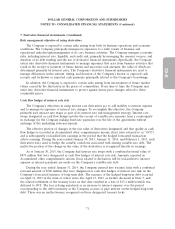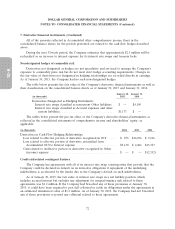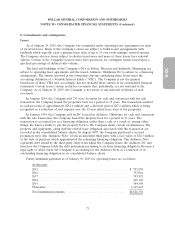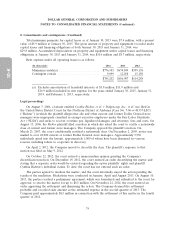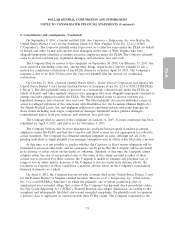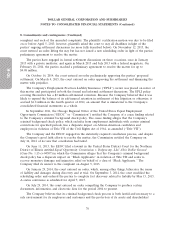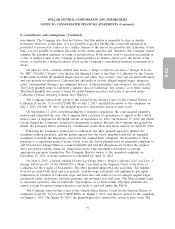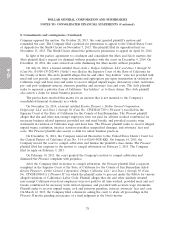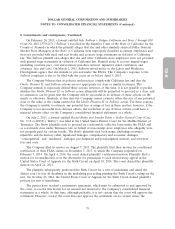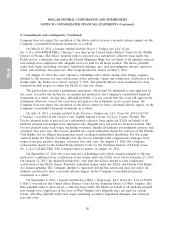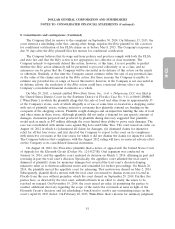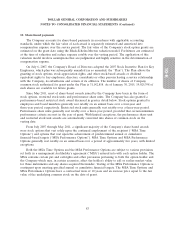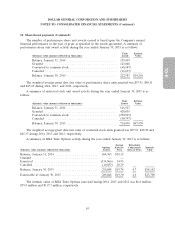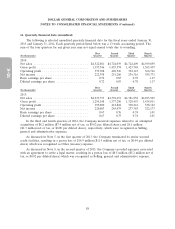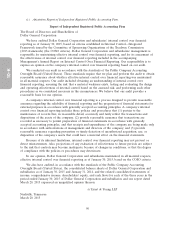Dollar General 2014 Annual Report Download - page 155
Download and view the complete annual report
Please find page 155 of the 2014 Dollar General annual report below. You can navigate through the pages in the report by either clicking on the pages listed below, or by using the keyword search tool below to find specific information within the annual report.
10-K
DOLLAR GENERAL CORPORATION AND SUBSIDIARIES
NOTES TO CONSOLIDATED FINANCIAL STATEMENTS (Continued)
8. Commitments and contingencies (Continued)
The Company filed its answer to the complaint on September 30, 2014. On February 13, 2015, the
court entered a scheduling order that, among other things, requires the Riley plaintiff to file a motion
for conditional certification of her FLSA claims on or before May 8, 2015. The Company’s response is
due 30 days after the Riley plaintiff files her motion for conditional certification.
The Company believes that its wage and hour policies and practices comply with both the FLSA
and state law and that the Riley action is not appropriate for collective or class treatment. The
Company intends to vigorously defend this action; however, at this time, it is not possible to predict
whether the Riley action ultimately will be permitted to proceed collectively or as a class, and no
assurances can be given that the Company will be successful in its defense of this action on the merits
or otherwise. Similarly, at this time the Company cannot estimate either the size of any potential class
or the value of the claims asserted in the Riley action. For these reasons, the Company is unable to
estimate any potential loss or range of loss in this matter; however, if the Company is not successful in
its defense efforts, the resolution of the Riley action could have a material adverse effect on the
Company’s consolidated financial statements as a whole.
On May 20, 2011, a lawsuit entitled Winn-Dixie Stores, Inc., et al. v. Dolgencorp, LLC was filed in
the United States District Court for the Southern District of Florida (Case No. 9:11-cv-80601-DMM)
(‘‘Winn-Dixie’’) in which the plaintiffs allege that the sale of food and other items in approximately 55
of the Company’s stores, each of which allegedly is or was at some time co-located in a shopping center
with one of plaintiffs’ stores, violates restrictive covenants that plaintiffs contend are binding on the
occupants of the shopping centers. Plaintiffs sought damages and an injunction limiting the sale of food
and other items in those stores. Although plaintiffs did not make a demand for any specific amount of
damages, documents prepared and produced by plaintiffs during discovery suggested that plaintiffs
would seek as much as $47 million although the court limited their ability to prove such damages. The
case was consolidated with similar cases against Big Lots and Dollar Tree. The court issued an order on
August 10, 2012 in which it (i) dismissed all claims for damages, (ii) dismissed claims for injunctive
relief for all but four stores, and (iii) directed the Company to report to the court on its compliance
with restrictive covenants at the four stores for which it did not dismiss the claims for injunctive relief.
The Company believes that compliance with the August 2012 ruling will have no material adverse effect
on the Company or its consolidated financial statements.
On August 28, 2012, the Winn-Dixie plaintiffs filed a notice of appeal with the United States Court
of Appeals for the Eleventh Circuit (Docket No. 12-14527-B). Oral argument was conducted on
January 16, 2014, and the appellate court rendered its decision on March 5, 2014, affirming in part and
reversing in part the trial court’s decision. Specifically, the appellate court affirmed the trial court’s
dismissal of plaintiffs’ claim for monetary damages but reversed the trial court’s decision denying
injunctive relief as to thirteen additional stores and remanded for further proceedings. On March 26,
2014, the plaintiffs moved the appellate court for rehearing. That motion was denied on May 2, 2014.
Subsequently, plaintiff filed a motion with the trial court on remand to dismiss stores not located in
Florida from the case without prejudice, which the court denied on September 29, 2014. Further, the
parties have, as directed by the trial court, submitted briefs in an effort to clarify the issues to be
resolved on remand. On November 19, 2014, the court issued an order (i) permitting the parties to
conduct additional discovery regarding the scope of the restrictive covenants at issue in light of the
Eleventh Circuit’s decision, and (ii) scheduling a bench trial to resolve any outstanding issues on the
court’s April 20, 2015 docket. On February 10, 2015, Winn-Dixie filed a motion for summary judgment,
81


